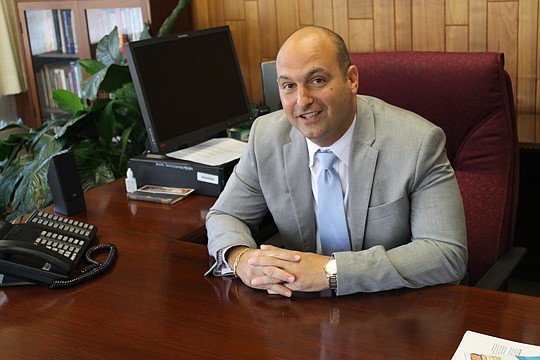
By Carole Hawkins, [email protected]
Nikolai Vitti is aware Duval County has a rap as a poor school district for student performance when compared to St. Johns and Clay counties to the south.
It’s something Realtors care about. High student test scores brand St. Johns and Clay as ideal places for families to live, and that raises property values.
In Duval, that’s not the case.
Vitti is on a mission to change the conversation.
Now finishing his second year as superintendent of Duval County Public Schools, Vitti has a reputation for turning around failing schools. And he readily admits in Duval, there’s work to be done.
But, he also challenges the comparisons between Duval and St. Johns.
“I think you have to look deeper,” Vitti said, “because our district is so much more diverse and larger than St. Johns.”
St. Johns serves students that are largely middle- and upper middle-class.
Isolate the same kind of places in Duval, for example Fletcher and Mandarin high schools and their feeders, and Duval becomes more competitive.
Several magnet schools, like Douglas Anderson School of the Arts, Stanton College Preparatory School, Paxon School for Advanced Studies and Darnell Cookman School of the Medical Arts, have national recognition.
“There are more nationally recognized schools in Duval than in St. Johns.” Vitti said
Compare Duval schools to other large urban districts — in Miami-Dade, Hillsborough and Orange counties — and Duval scores nearly average in overall performance and high in narrowing the achievement gap between white and black students.
The achievement gap is a key focus for Vitti. If the lowest-performing students improve, the entire district improves. This year, Vitti kicked off a program to offer pay incentives for the best teachers and principals to work in Duval’s lowest performing schools.
Vitti knows how students feel when they are unsuccessful in school.
That’s because he suffers from dyslexia. Nobody realized it for years, said Vitti whose parents were immigrants who didn’t speak English.
“I liked school socially, but I struggled academically. In fact I didn’t even think of myself as smart,” Vitti said.
He also knows what success feels like.
After earning a master’s and Ph.D from Harvard, Vitti has worked as a teacher and administrator in some of the nation’s largest and toughest school districts. He’s also led school improvement initiatives for the Florida Department of Education.
His past has defined his mission as an educator — Vitti wants to help kids who, like him, started life behind the curve.
Vitti grew up in a working class home in Detroit, the son of Italian and Argentinian immigrants. In school, he excelled in basketball, baseball and football.
He never saw himself becoming a teacher. He thought he’d be professional athlete.
It was a high school teacher who finally told him how smart he was. He had a natural gift for synthesizing and analyzing information quickly.
“More than anything, that increased my self-esteem,” Vitti said. “It made me stop projecting the assumptions people had of me because they knew me as an athlete. And because I was a struggling reader.”
He attended Wake Forest University in North Carolina on a football scholarship.
After one year, he told his coach he had to stop playing.
“Once I was in college and I was exposed to all this knowledge and information, I literally fell in love with it,” Vitti said. “I saw how advanced my classmates were, and I said ‘I’ve got to catch up.’”
He worked in the library where he constantly read books –– even the dictionary. He would go on to become one of the top students in his class, graduating Phi Beta Kappa.
After graduation, Vitti worked as a teacher in low-performing schools in Winston-Salem’s urban core. Then he and his wife, who also was a teacher, moved to New York City.
“I said, ‘I want to go somewhere where the challenge would be most intense, because if I could do it there I could do it anywhere,’” he said.
Vitti loved teaching. He had no ambition to become an administrator, but other teachers pushed him toward it because they saw underperforming students become focused and engaged in his classroom.
As he rose in the field, Vitti remained focused on underserved communities, both in New York and later in Miami-Dade County.
After the Miami-Dade district became a finalist for the prestigious Broad Award for Excellence in Urban Education, Vitti was pursued by many schools to fill a role as superintendent.
The only place he applied was Jacksonville, a place where he said his experience best fit the community’s need.
“I felt that this was my destiny. And, I want to be here for a long time,” Vitti said.
“I want to see this through so that I can make this sustainable and eventually look back at the work that was done. There are only a few large urban districts that have that story to tell, and that’s what I want to be a part of.”